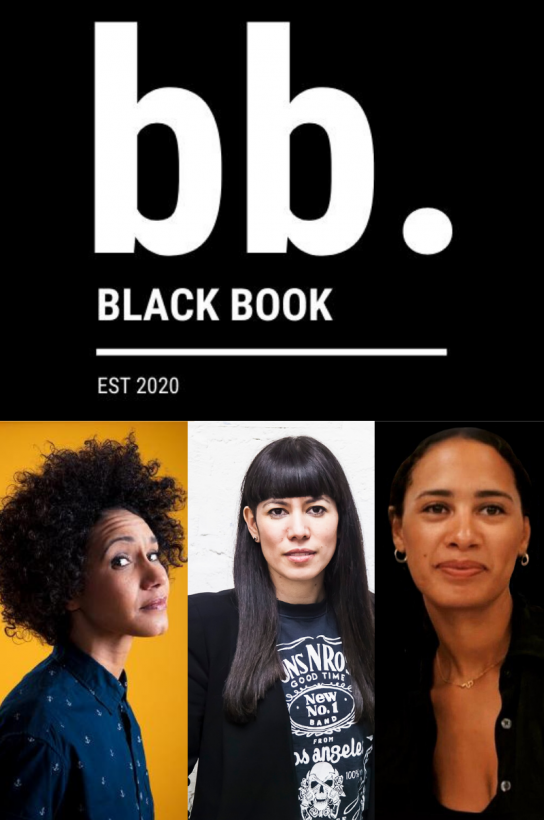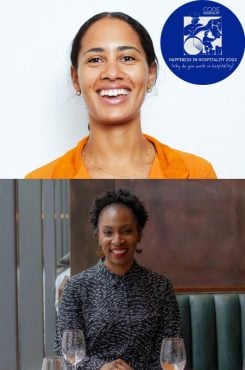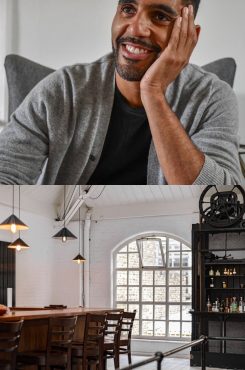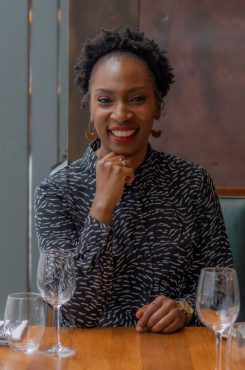CODE meets the founders of representation platform Black Book
Published 30 September 2020
by Harriet Prior

This week, we meet the three founders of Black Book Dr Anna Sulan Masing, Zoe Adjonyoh and Frankie Reddin to hear more about the global representation platform for Black and non-white people working within hospitality. We discuss their mission, barriers to equality and the role individuals can play.
For those that don’t know what Black Book is, how can you describe it in a couple of sentences?
At the end of June 2020, we founded Black Book: a global representation platform for Black and non-white people working within hospitality and food media. With a mission to inspire and empower through enhancing visibility, equality, equity and wealth creation worldwide within these communities, Black Book will raise global consciousness of the issues affecting their ability to thrive in these industries. As a team, the three founders will do this through representing emerging talent; offering consultancy services to companies and brands wanting to align better with a vision for a more inclusive industry; securing brand partnerships around Black Book content; and building a holistic mentorship programme launching in 2021.
How did the idea for Black Book come about?
The platform came into fruition due to an obvious lack of representation and radical spaces within the UK for Black and non-white people working within food. Zoe’s travels to the US and specifically New York, found that the UK lacked collegiate representation seen in platforms and collectives such as Black Food Folks, Radical Exchange and Equity At The Table.
And what is Black Book’s aim?
First and foremost, make our four pillars: visibility, equality, equity and wealth creation, a tangible reality for Black and non-white people within the food and drink industry. But also – not to be the sole solution. We want to be the one of the first of many platforms who work toward these values.
What kind of brands are you interested in working with as part of your consultancy service?
This could really extend to any brand, company, corporate or entity, whatever their size and scope. What has been clear in the last decade or so, through the growth of food media, the popularisation of the hospitality industry and the reliance of global economies on the food and drink industries – whether that reliance be for culture, sustenance, economy or commercial opportunity – is that food is able to speak across many borders all boundaries. Everyone’s gotta eat. The reality however, is that there is a large majority not invited or welcomed to that table. So through the medium of food, Black Book can offer diversity and inclusion consultancy to guarantee progress toward a more equitable, equal and representative society.
You did an eight-week series on ‘de-colonising the food industry’ during lockdown. Tell us a bit more about that?
Black Book designed and hosted an eight-week series of online talks, called ‘De-colonising the food industry’, with thought leaders and activists, to identify and examine the key issues that need to be addressed within the global food and drink industry. Zoe facilitated all of the talks which ran through key topics relevant to the industry. From “Publishing: what the #publishingpaidme hashtag revealed” to “Funding & Investment: who has the access and the support?”, “The Role of Food Critics: what are they good for?”, and “Farming & Agriculture”. The talks delved into each topic in an open forum with a motivation to push the narrative forward into positive change. All of the talks have been recorded and will be available online at an accessible price when we launch in 2021.
Is lack of education one of the biggest barriers to equality currently?
In all honesty, it is less about a lack of education but rather, at times, willful ignorance. Yes people need to go out and educate themselves by reading and researching around racism, sexism, ableism etc, but a lot of what creates – or rather upholds – these unequal structures is a lack of willingness to be educated. So ask about ‘a lack of education’ implies that there lacks the resources or the access to the structures to be educated, but they are all there. Not only in the voices of the people – such as us at Black Book who have been speaking individually on these matters for years – but also in literature, statistics, articles, podcasts, and in protests. There really isn’t an excuse not to be deep in learning about inequality.
Education is also a process, a creative process, which is why it should appeal to the hospitality world – to overcome barriers to equality is to be constantly learning and experimenting and trying to find new and better ways to work.
But, it is a very difficult road, it is one where everyone has to feel uncomfortable and re-think a lot of learning that has been ingrained in us. Therefore we hope that Black Book will be a place to access this information, and it will be an accessible place for learning for all, hence why we did the ‘De-colonising the food industry’ panel series, for free – and so many people gave their time for free to be on these panels! The willingness to share knowledge is huge, and we do not take this for granted.
What role do individuals play when working towards visibility, equality and equity for these communities and how can we all help?
Diversity can be an empty word, an array of different people at a workplace might offer a better outcome to businesses, but without structures changing then the space isn’t safe and really interesting work won’t happen. The lack of diversity in the food and drinks world is because it is a colonised one, which centres the white experience / lens / culture; this centring puts less value on anyone – including their food – outside of that ‘norm’.
Therefore, individuals should be looking at ensuring safe spaces so that people feel empowered to speak up, to make changes when necessary and to feel comfortable in challenging their own norms.
There has been a lot of performative action – across industries, across the globe – without a look at the structures people and businesses operate in. Again, this comes back to the education question – there is no excuse to not do the work, because there are people out there (such as Black Book) who have the expertise to see how and why diversity measures aren’t actually working.
It is also about understanding that “these communities” are part of “your community”. Black and non-white people are everywhere in the food world, at every level – supporting those people is about supporting the industry.
And how can hospitality businesses play their part?
It can be as simple as recognising the input of Black and non-white people in the industry. It is about looking at the staff make-up of an organisation and questioning why certain individuals are not being promoted. It is about recognising histories and talking openly about them. It is about platforming, supporting, showcasing and encouraging voices that are less heard. And, it is about active listening.
What’s next for Black Book in 2020 and beyond?
We’re about to host our second series of events celebrating Black History Month, which will take place every Tuesday throughout October. There’ll be a full day of workshops, masterclasses, cook-a-longs and discussions that explore the four pillars of Black Book in meaningful and dynamic ways. You can see the full line up and grab tickets here. We’ve also signed our first client within the representation arm of Black Book – the wonderful, Elainea Emmott who is a chef and photographer. Her website is here. We’ll be launching our Crowdfunder campaign at the end of the year that will act as a springboard for our mentorship programme launching in 2021. Plus there’s talks of Black Book memberships, podcasts and global outposts… you’ll have to sign up to our newsletter to keep abreast of all the news!
To read about more platforms championing change through action, click here




